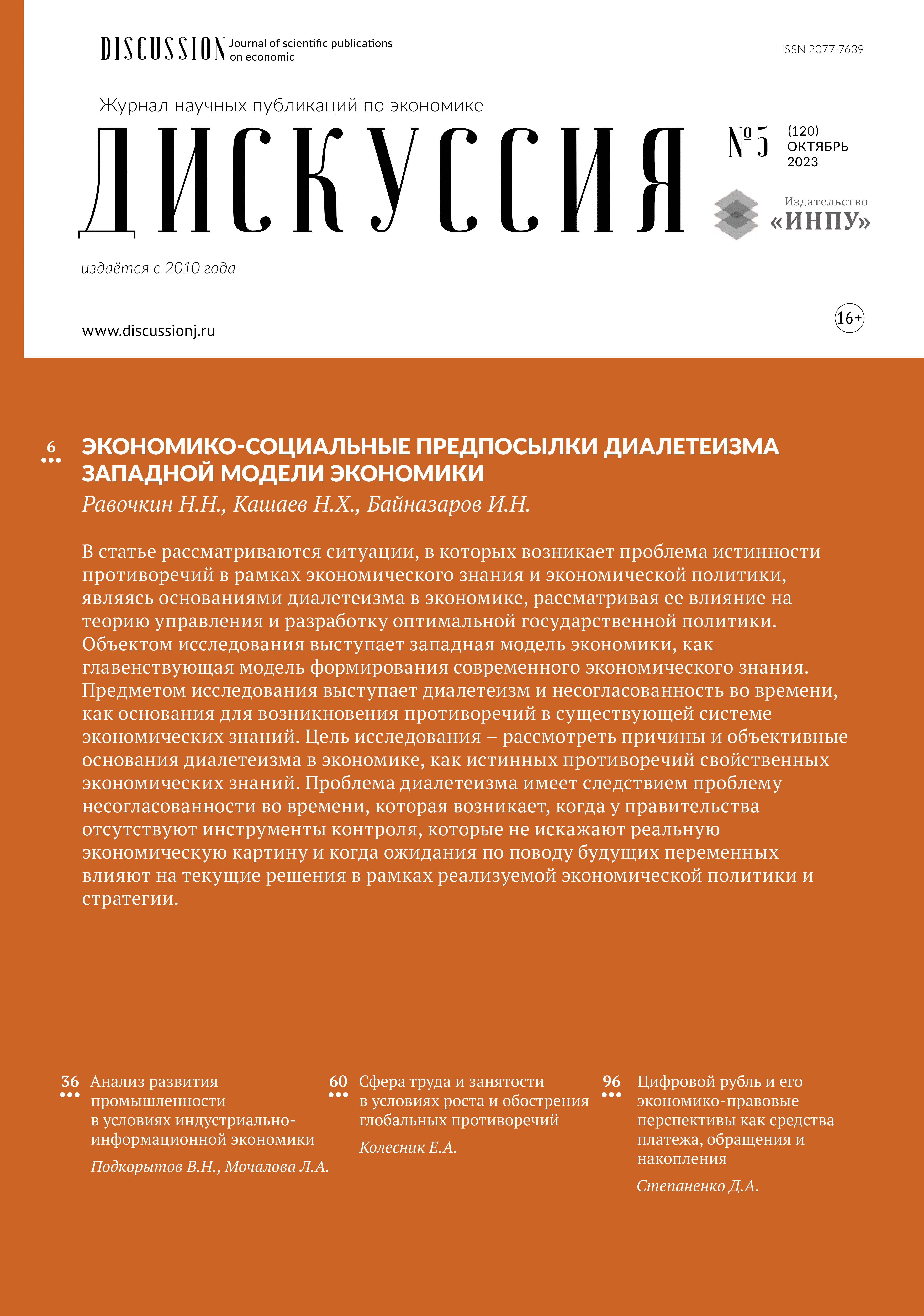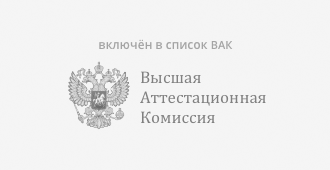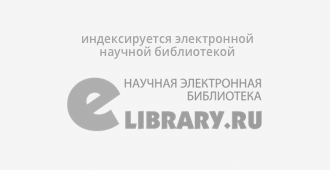COMMUNICATIONS IN THE TEACHER – UNIVERSITY SYSTEM IN THE DIGITAL ENVIRONMENT
Keywords:
transactional distance, distance education, digital educational environment, digital economy, open educationAbstract
The theoretical significance of the study lies in the fact that the digital educational environment involves the use of an integrated approach to methods and means of communication, given the novelty of the digitalization of the educational environment, the need for the participation of the scientific community in the study of new issues is obvious. The object of research is the digital educational environment. The subject of the research is communication processes in the digital educational environment. The purpose of the study is to find ways to build effective communication and intermediate support in building a modern digital educational environment. The article outlines the historical background of the emergence of distance education. The article argues that distance education methods, such as providing educational materials for self-paced learning, can be effectively introduced into traditional classroom-based education. As a mode of delivery (communication) of education, distance education involves the physical and/or temporary separation of teachers and students for most or all of the learning process and focuses on the design and implementation of teaching, learning, support and assessment, including the use of information and communication technologies that are aimed at providing educational opportunities for students outside the educational organization. The problem of transactional distance is considered. Based on generally accepted world practice, the main sections of digital education in the digital educational environment are identified.
Downloads
Metrics
References
Данилов, А. Н. Цифровая революция и образование / А. Н. Данилов // Социальные практики и развитие городской среды: урбанистика и инноватика : Материалы международной научно-практической конференции, Минск, 25–26 ноября 2021 года / Редколлегия: И.В. Пинчук (гл. ред.) [и др.]. – Минск: Белорусский государственный университет, 2021. – С. 97-103. – EDN DMVDRJ.
Скворцова, Е. М. Гуманитарное образование в российской высшей школе в условиях цифровой революции: факторы успеха и пути оптимизации / Е. М. Скворцова, Н. О. Воскресенская // Педагогика. Вопросы теории и практики. – 2021. – Т. 6, № 4. – С. 555-562. – DOI 10.30853/ped210088. – EDN PKMRJL.
Pinto M., Leite C. Digital technologies in support of students learning in Higher Education: literature review //Digital education review. – 2020. – №. 37. – С. 343-360.
Dunleavy G. et al. Mobile digital education for health professions: systematic review and meta-analysis by the digital health education collaboration //Journal of medical Internet research. – 2019. – Т. 21. – №. 2. – С. e12937.
Sarker M. N. I. et al. Leveraging digital technology for better learning and education: A systematic literature review //International Journal of Information and Education Technology. – 2019. – Т. 9. – №. 7. – С. 453-461.
Benavides L. M. C. et al. Digital transformation in higher education institutions: A systematic literature review //Sensors. – 2020. – Т. 20. – №. 11. – С. 3291.
Timotheou S. et al. Impacts of digital technologies on education and factors influencing schools' digital capacity and transformation: A literature review //Education and information technologies. – 2023. – Т. 28. – №. 6. – С. 6695-6726.
Zhao Y., Llorente A. M. P., Gómez M. C. S. Digital competence in higher education research: A systematic literature review //Computers & Education. – 2021. – Т. 168. – С. 104212.
Селиванов, В. В. Формирование системного подхода к организации дистанционного образования в университетах / В. В. Селиванов // Информационные системы и технологии в моделировании и управлении : Сборник трудов V Международной научно-практической конференции, Ялта, 20–22 мая 2020 года / Отв. редактор К.А. Маковейчук. – Ялта: Общество с ограниченной ответственностью «Издательство Типография «Ариал», 2020. – С. 434-437. – EDN CWDMTE.
Kentnor H. E. Distance education and the evolution of online learning in the United States //Curriculum and teaching dialogue. – 2015. – Т. 17. – №. 1. – С. 21-34.
Emmerson A. M. A history of the changes in practices of distance education in the United States from 1852–2003. – Dowling College, 2005.
Diner S. J. Department and discipline: The department of sociology at the University of Chicago, 1892-1920 //Minerva. – 1975. – С. 514-553.
Slotten H. R. Radio's hidden voice: Noncommercial broadcasting, extension education, and state universities during the 1920s //Technology and Culture. – 2008. – Т. 49. – №. 1. – С. 1-20.
Hilliard R. L. Television and education //The Journal of Higher Education. – 1958. – Т. 29. – №. 8. – С. 431-470.
Smith L. Education for broadcasting: 1929–1963 //Journal of Broadcasting & Electronic Media. – 1964. – Т. 8. – №. 4. – С. 383-398.
VAN ARSDALL J. E. THE STATED AND OPERATIVE OBJECTIVES OF THE UNIVERSITY OF NEBRASKA EXTENSION HIGH SCHOOL PROGRAM, 1929-1975. – The University of Nebraska-Lincoln, 1977.
Rumble G. Re-inventing distance education, 1971? 2001 //International Journal of Lifelong Education. – 2001. – Т. 20. – №. 1-2. – С. 31-43.
Clifton N. P. PROFESSIONALIZATION IN COMMUNITY COLLEGE EDUCATION: 1975-1982. – North Carolina State University, 1985.
Hoffer T. B. et al. Doctorate Recipients from United States Universities: Summary Report 2000. Survey of Earned Doctorates. – 2001.
Wolfs F. The Introduction of Computer-Assisted Personalized Assignment Systems (CAPA). – 1999.
Eisenstadt M. et al. Teaching, learning and collaborating at a virtual summer school //Remote Cooperation: CSCW Issues for Mobile and Teleworkers. – London : Springer London, 1996. – С. 177-219.
Subramanian P. et al. A study of comparison between Moodle and Blackboard based on case studies for better LMS //Journal of Information Systems Research and Innovation. – 2014. – Т. 6. – С. 26-33.
Mark G., Ganzach Y. Personality and Internet usage: A large-scale representative study of young adults //Computers in Human Behavior. – 2014. – Т. 36. – С. 274-281.
Connors B. Assessment in the distance-education situation //Distance teaching for higher and adult education. – Routledge, 2018. – С. 162-176.
Dikli S. Assessment at a distance: Traditional vs. alternative assessments //Turkish Online Journal of Educational Technology-TOJET. – 2003. – Т. 2. – №. 3. – С. 13-19.
Шпагина, Е. В. Основные положения и различия дистанционного и открытого обучения / Е. В. Шпагина // Вестник Костромского государственного университета. Серия: Педагогика. Психология. Социокинетика. – 2016. – Т. 22, № 2. – С. 26-29. – EDN WKOXJV.
Бахолдина, М. А. Оценивание состояний модулированного обобщенного полусинхронного потока событий при непродлевающемся мертвом времени / М. А. Бахолдина, А. М. Горцев // Известия вузов. Физика. – 2013. – Т. 56, № 9-2. – С. 217-219. – EDN RWIFMP.
Downloads
Published
How to Cite
Issue
Section
Categories
License
Copyright (c) 2024 admin admin

This work is licensed under a Creative Commons Attribution-NonCommercial-NoDerivatives 4.0 International License.
Авторы, публикующие произведения в журнале «Дискуссия», соглашаются со следующими условиями:
- Авторы сохраняют за собой авторское право и предоставляют журналу право первой публикации произведения, одновременно лицензированной в соответствии с лицензией Creative Commons Attribution, позволяющей другим лицам пользоваться произведением с подтверждением авторства и первоначальной публикации в журнале «Дискуссия».
- Авторы вправе заключать с иными лицами лицензионные договоры на условиях простой (неисключительной) лицензии на использование опубликованного в журнале «Дискуссия» произведения (например, размещение его в базах данных университетов, публикация в книге), со ссылкой на его оригинальную публикацию в этом журнале.
- Автор гарантирует, что является правообладателем всех материалов, предоставляемых в редакцию, и что исключительные права на данные материалы не переданы или не предоставлены другим лицам.
- Авторам разрешено и рекомендуется размещать свое произведение в Интернете до и во время процесса подачи, поскольку это может привести к продуктивному обмену, а также к более раннему и более широкому цитированию опубликованных работ.
С момента загрузки произведения и сопроводительных материалов через раздел "Отправка материалов", автор полностью и безоговорочно принимает (акцептует) публичную оферту о заключении авторского соглашения об опубликовании произведения. В соотвтетствии с этим соглашением автор предоставляет издателю на безвозмездной основе неисключительную лицензию на использование созданного автором произведения.
С момента получения произведения и прилагаемых к нему материалов журнал "Дискуссия" вправе использовать полученные произведения без ограничений по своему усмотрению и в пределах всего срока действия исключительных прав, но с обязательным указанием имени автора (авторов) произведения, в том числе публиковать произведения (полностью или в сокращении) на территории всего мира, переводить на другие языки, направлять в репозитории научной информации, размещать в сети Интернет и использовать другими законными способами.









